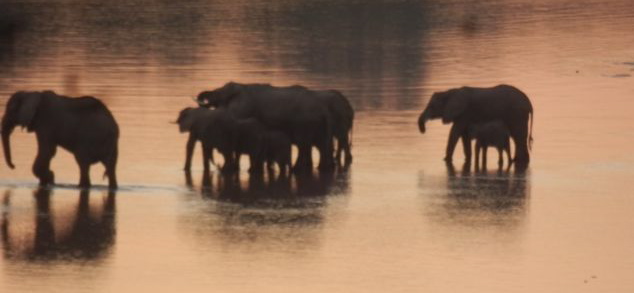Two months after returning home from our third Open Heart Safari to Zambia, I am still – in the words of one our participants – “struggling to find words powerful and profound enough to describe the experience.”
Of course, the wildlife viewing was spectacular.
Even when we didn’t have our binoculars out, like the afternoon we came up on a gorgeous large male leopard relaxing in the shade, as we were lazily returning from a soak in a natural warm spring. Other highlights included:
- Wild dogs: we saw them on walking safari at a remote bush camp on the Kafue River.
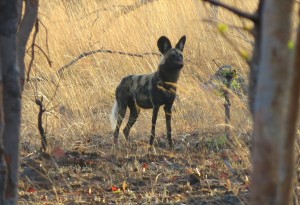 No other human beings for miles. Wild dogs are rare and seldom seen – in my many visits to the African bush, this was the first time I’d ever seen them anywhere.
No other human beings for miles. Wild dogs are rare and seldom seen – in my many visits to the African bush, this was the first time I’d ever seen them anywhere. - A pride of 15 lions hunting buffalo in the evening. With no other vehicles around, we were able to watch the young males racing ahead, while other pride members waited alertly to share in the kill. (They didn’t – the young ones struck out that evening.)
- Three cheetah devouring a recently killed impala … the day after our guide told us we would not see cheetah in that area.
- Getting startled by an impala leaping out of the trees with a leopard on its tail.
- A large herd of the rare and beautiful sable antelope.
- A giant python right by the road.
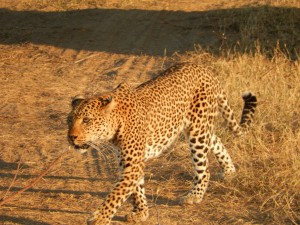 And every day: elephants crossing the river right in front of us, passing through our camp, strolling by our morning meditation; thousands of hippos in the river, some of them wandering through our camp at night; herds of impala, buffalo, puku, zebra, giraffe, warthog, kudu…; regular sightings of the reclusive and beautiful bushbuck; the constant presence of baboons and vervet monkeys; more kinds of spectacular birds than I can name.
And every day: elephants crossing the river right in front of us, passing through our camp, strolling by our morning meditation; thousands of hippos in the river, some of them wandering through our camp at night; herds of impala, buffalo, puku, zebra, giraffe, warthog, kudu…; regular sightings of the reclusive and beautiful bushbuck; the constant presence of baboons and vervet monkeys; more kinds of spectacular birds than I can name.
Our community visits were amazing.
From rural villages to urban squatters’ settlement, we were warmly welcomed.
- In a remote village in eastern Zambia we were received by Chief Mkhanya and his entourage at his palace, learned the protocol of meeting a chief, and discussed issues of westernization and tradition, climate change, and economic empowerment.
- We were hosted by a women’s group in an informal settlement in Lusaka (Zambia’s
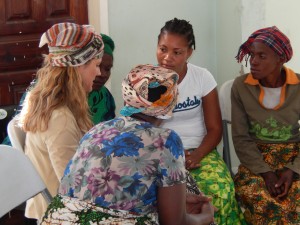 principal city). We learned about African urban poverty and local people’s initiatives to empower themselves, saw new waterless public toilets (where recently there had no sanitation, leading to severe cholera outbreaks), shopped in the market, and were invited to women’s homes; there was also singing, dancing, improv games, and lots of laughter. One highlight was watching the “elder” of our group, a 78-year-old California woman bond with a local woman in her 70s – with no shared language, they wandered through the streets holding hands and laughing.
principal city). We learned about African urban poverty and local people’s initiatives to empower themselves, saw new waterless public toilets (where recently there had no sanitation, leading to severe cholera outbreaks), shopped in the market, and were invited to women’s homes; there was also singing, dancing, improv games, and lots of laughter. One highlight was watching the “elder” of our group, a 78-year-old California woman bond with a local woman in her 70s – with no shared language, they wandered through the streets holding hands and laughing. - We met an elder of the Bisa tribe, who was instrumental in restoring the elephant population of North Luangwa, and we learned about the human costs of park development – his community had been involuntarily displaced.
- We met activists in conservation and economic empowerment from different parts of the country (including the only Zambian ever to win a Goldman Environmental Award), and learned about their efforts to preserve indigenous
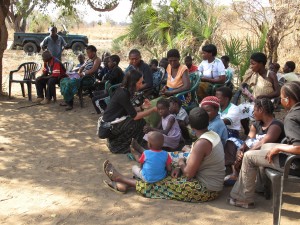 culture, and to promote community management and control of resources.
culture, and to promote community management and control of resources.
The quality of the group experience was remarkable.
After three pre-trip conference calls, our fellow travelers arrived feeling that they already knew each other, and were ready to jump right in, open their hearts, and connect. Two weeks later, so many tear-filled good-byes, warm hugs, people making plans to return to Africa. Six weeks after the trip ended, they organized a reunion in Oakland – almost everyone attended.
Before the trip, our group had researched and organized gifts to bring: nondeflatable soccer balls, solar-powered calculators, bras for teenage girls…. Even more powerfully, they brought their own gifts. Songs to share and wanting to learn local songs, so our meetings with local people were filled with singing and dancing. Two acupuncturists brought their needles, and offered relaxation treatments to our group, and to community groups we met with. Another traveler brought songs to share and and the desire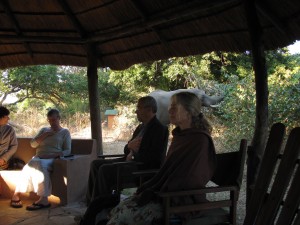 to learn local songs to teach children back home. Others brought their skills at group facilitation, environmental engineering, and public speaking. And so our meetings were filled with warmth, singing and dancing, relaxation, and substantive exchanges of ideas.
to learn local songs to teach children back home. Others brought their skills at group facilitation, environmental engineering, and public speaking. And so our meetings were filled with warmth, singing and dancing, relaxation, and substantive exchanges of ideas.
Our days began with short meditations and poetry reading at dawn. We did yoga at river stops and tea breaks and with a giggling audience of village children. Our meditations were punctuated by the sounds of the bush: the whirring of birds, honks of hippos, shrieks of monkeys, and leaf munching of all too close elephants. Throughout we shared our impressions and reactions in circles that were deep, warm, teary and memorable. In the words of one participant, “this was such a powerful  experience that it was enriched and heightened by sharing it so intimately with the group. For me, it really was too much to take in and hold just on my own.”
experience that it was enriched and heightened by sharing it so intimately with the group. For me, it really was too much to take in and hold just on my own.”
Oh, did I say we had fun? So much laughter, long conversations. delicious meals (believe it or not). To quote one more participant once more: “We had a lot of fun together, laughed a lot and bonded closely – all enhanced, in turn, by the magnitude of what we were experiencing together.”
For me personally, I experienced deep satisfaction at our closing circle, hearing our travelers describe the experience as life-changing, and realizing that what had manifested was so much what I envisioned six years ago when I first thought of organizing a group trip like this.
